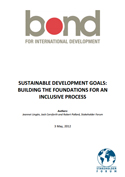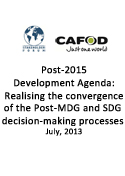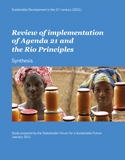Millenium Booklets
|
|
The Millennium Papers are a series of discussion booklets that were produced by Stakeholder Forum in the run up to the Earth Summit 2002. Authored by some of the world’s leading thinkers in sustainable development, the booklets provide an instant snap shot across a range of issues of the progress made since Rio, the challenges encountered and the way forward. They provide a valuable record of the state of sustainable development on the eve of a new millennium, and tackle issues still core to the conversation today. |
Towards Earth Summit III: Issue 1The first in the series, this introduction demonstrates the very real need for revisiting and reinvigorating the concept of sustainable development, particularly in light of the weight of growing human production and consumption and the continuing growth of world population. Such problems and challenges will require international solutions. |
|
The Future of Local Agenda 21 in the New Millennium: Issue 2Edited by Gary Lawrence, one of the key thinkers on sustainable development, this issue tackles the question of the future of Local Agenda 21 on the eve of a new millennium. How does LA21 differ from the traditional rational planning models? How do we know that the problems/issues/opportunities we are addressing will be the problems/issues/opportunities we will actually face? Have we ignored the institutional barriers to successful long term LA21’s, and if so, do we have the political skills to win the intra and inter-institutional struggles? |
|
Women and Sustainable Development – from Local to International: Issue 3The third issue in the Millennium Papers series examines the role of women in the context of sustainable development. Reviewing progress since the 1992 Rio Earth Summit, the publication makes the case for mainstreaming gender and development into the heart of all policy-making, and stresses that sustainable development will remain an elusive goal unless women’s contribution to environmental management is recognised and supported. |
|
You may also like... |






